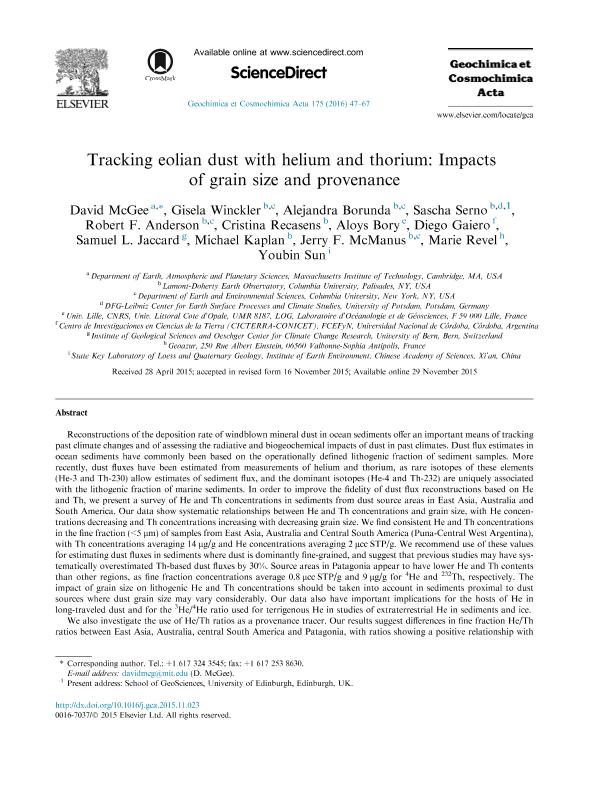Mostrar el registro sencillo del ítem
dc.contributor.author
McGee, David
dc.contributor.author
Winckler, Gisela
dc.contributor.author
Borunda, Alejandra
dc.contributor.author
Serno, Sascha
dc.contributor.author
Anderson, Robert F.
dc.contributor.author
Recasens, Cristina
dc.contributor.author
Bory, Aloys
dc.contributor.author
Gaiero, Diego Marcelo

dc.contributor.author
Jaccard, Samuel L.
dc.contributor.author
Kaplan, Michael

dc.contributor.author
McManus, Jerry F.
dc.contributor.author
Revel, Marie
dc.contributor.author
Sun, Youbin
dc.date.available
2021-04-13T21:11:40Z
dc.date.issued
2016-02
dc.identifier.citation
McGee, David; Winckler, Gisela; Borunda, Alejandra; Serno, Sascha; Anderson, Robert F.; et al.; Tracking eolian dust with helium and thorium: Impacts of grain size and provenance; Pergamon-Elsevier Science Ltd; Geochimica et Cosmochimica Acta; 175; 2-2016; 47-67
dc.identifier.issn
0016-7037
dc.identifier.uri
http://hdl.handle.net/11336/129974
dc.description.abstract
Reconstructions of the deposition rate of windblown mineral dust in ocean sediments offer an important means of tracking past climate changes and of assessing the radiative and biogeochemical impacts of dust in past climates. Dust flux estimates in ocean sediments have commonly been based on the operationally defined lithogenic fraction of sediment samples. More recently, dust fluxes have been estimated from measurements of helium and thorium, as rare isotopes of these elements (He-3 and Th-230) allow estimates of sediment flux, and the dominant isotopes (He-4 and Th-232) are uniquely associated with the lithogenic fraction of marine sediments. In order to improve the fidelity of dust flux reconstructions based on He and Th, we present a survey of He and Th concentrations in sediments from dust source areas in East Asia, Australia and South America. Our data show systematic relationships between He and Th concentrations and grain size, with He concentrations decreasing and Th concentrations increasing with decreasing grain size. We find consistent He and Th concentrations in the fine fraction (<5μm) of samples from East Asia, Australia and Central South America (Puna-Central West Argentina), with Th concentrations averaging 14μg/g and He concentrations averaging 2μccSTP/g. We recommend use of these values for estimating dust fluxes in sediments where dust is dominantly fine-grained, and suggest that previous studies may have systematically overestimated Th-based dust fluxes by 30%. Source areas in Patagonia appear to have lower He and Th contents than other regions, as fine fraction concentrations average 0.8μccSTP/g and 9μg/g for 4He and 232Th, respectively. The impact of grain size on lithogenic He and Th concentrations should be taken into account in sediments proximal to dust sources where dust grain size may vary considerably. Our data also have important implications for the hosts of He in long-traveled dust and for the 3He/4He ratio used for terrigenous He in studies of extraterrestrial He in sediments and ice.We also investigate the use of He/Th ratios as a provenance tracer. Our results suggest differences in fine fraction He/Th ratios between East Asia, Australia, central South America and Patagonia, with ratios showing a positive relationship with the geological age of source rocks. He/Th ratios may thus provide useful provenance information, for example allowing separation of Patagonian sources from Puna-Central West Argentina or Australian dust sources. He/Th ratios in open-ocean marine sediments are similar to ratios in the fine fraction of upwind dust source areas. He/Th ratios in mid-latitude South Atlantic sediments suggest that dust in this region primarily derives from the Puna-Central West Argentina region (23-32°S) rather than Patagonia (>38°S). In the equatorial Pacific, He/Th ratios are much lower than in extratropical Pacific sediments or potential source areas measured as a part of this study (East Asia, South America, Australia) for reasons that are at present unclear, complicating their use as provenance tracers in this region.
dc.format
application/pdf
dc.language.iso
eng
dc.publisher
Pergamon-Elsevier Science Ltd

dc.rights
info:eu-repo/semantics/openAccess
dc.rights.uri
https://creativecommons.org/licenses/by-nc-sa/2.5/ar/
dc.subject
DUST
dc.subject
THORIUM
dc.subject
HELIUM
dc.subject
ISOTOPES
dc.subject.classification
Geoquímica y Geofísica

dc.subject.classification
Ciencias de la Tierra y relacionadas con el Medio Ambiente

dc.subject.classification
CIENCIAS NATURALES Y EXACTAS

dc.title
Tracking eolian dust with helium and thorium: Impacts of grain size and provenance
dc.type
info:eu-repo/semantics/article
dc.type
info:ar-repo/semantics/artículo
dc.type
info:eu-repo/semantics/publishedVersion
dc.date.updated
2021-03-26T19:37:40Z
dc.journal.volume
175
dc.journal.pagination
47-67
dc.journal.pais
Estados Unidos

dc.description.fil
Fil: McGee, David. Massachusetts Institute of Technology; Estados Unidos
dc.description.fil
Fil: Winckler, Gisela. Columbia University; Estados Unidos
dc.description.fil
Fil: Borunda, Alejandra. Columbia University; Estados Unidos
dc.description.fil
Fil: Serno, Sascha. Columbia University; Estados Unidos. University of Potsdam; Alemania
dc.description.fil
Fil: Anderson, Robert F.. Columbia University; Estados Unidos
dc.description.fil
Fil: Recasens, Cristina. Columbia University; Estados Unidos
dc.description.fil
Fil: Bory, Aloys. University Of Lille.; Francia
dc.description.fil
Fil: Gaiero, Diego Marcelo. Consejo Nacional de Investigaciones Científicas y Técnicas. Centro Científico Tecnológico Conicet - Córdoba. Centro de Investigaciones en Ciencias de la Tierra. Universidad Nacional de Córdoba. Facultad de Ciencias Exactas Físicas y Naturales. Centro de Investigaciones en Ciencias de la Tierra; Argentina
dc.description.fil
Fil: Jaccard, Samuel L.. University of Bern; Suiza
dc.description.fil
Fil: Kaplan, Michael. Columbia University; Estados Unidos
dc.description.fil
Fil: McManus, Jerry F.. Columbia University; Estados Unidos
dc.description.fil
Fil: Revel, Marie. Geoazur Laboratory; Francia
dc.description.fil
Fil: Sun, Youbin. Chinese Academy of Sciences. Institute of Earth Environment. State Key Laboratory of Loess and Quaternary Geology; China
dc.journal.title
Geochimica et Cosmochimica Acta

dc.relation.alternativeid
info:eu-repo/semantics/altIdentifier/doi/http://dx.doi.org/10.1016/j.gca.2015.11.023
dc.relation.alternativeid
info:eu-repo/semantics/altIdentifier/url/https://www.sciencedirect.com/science/article/abs/pii/S0016703715006626
Archivos asociados
